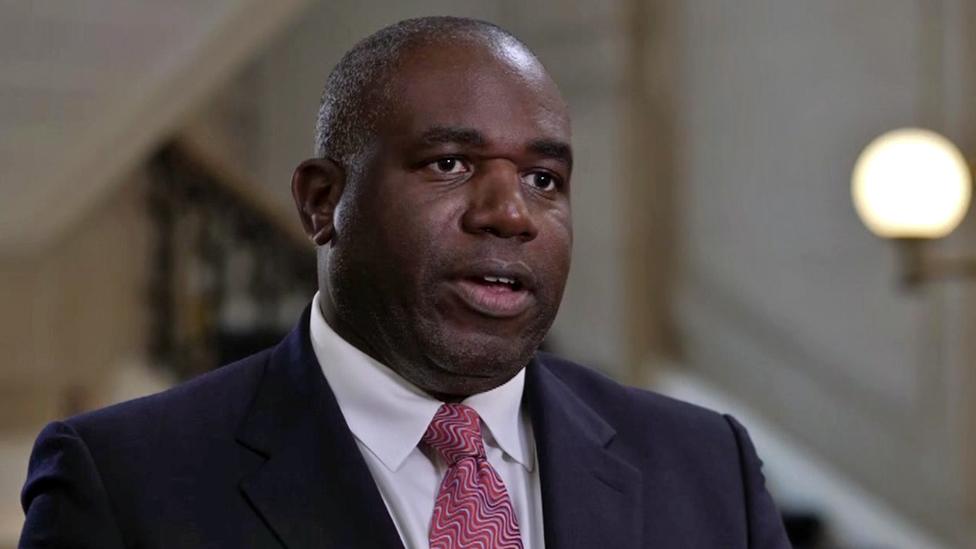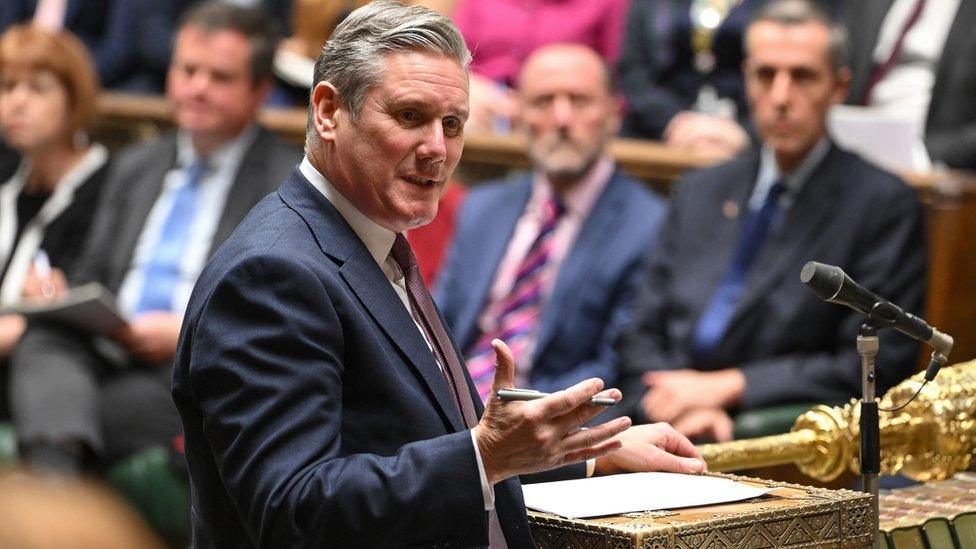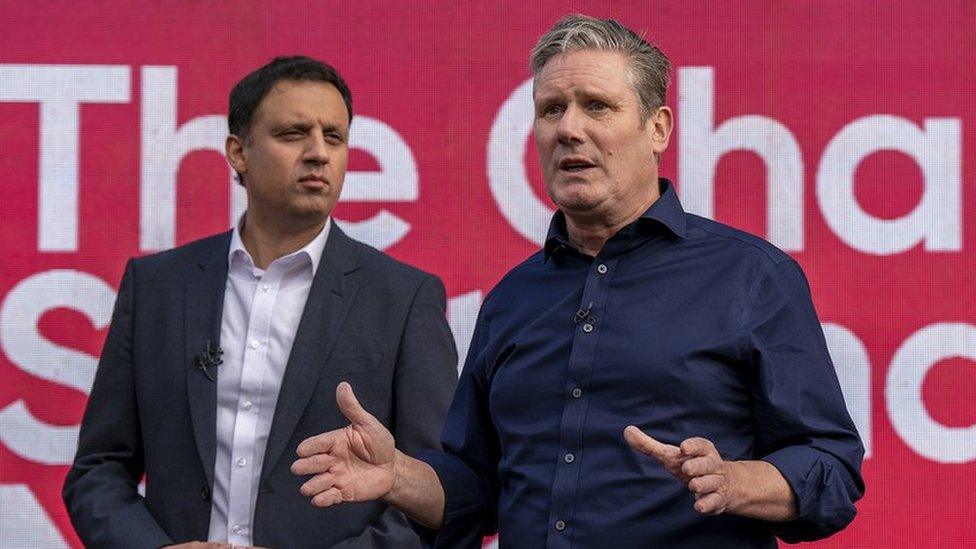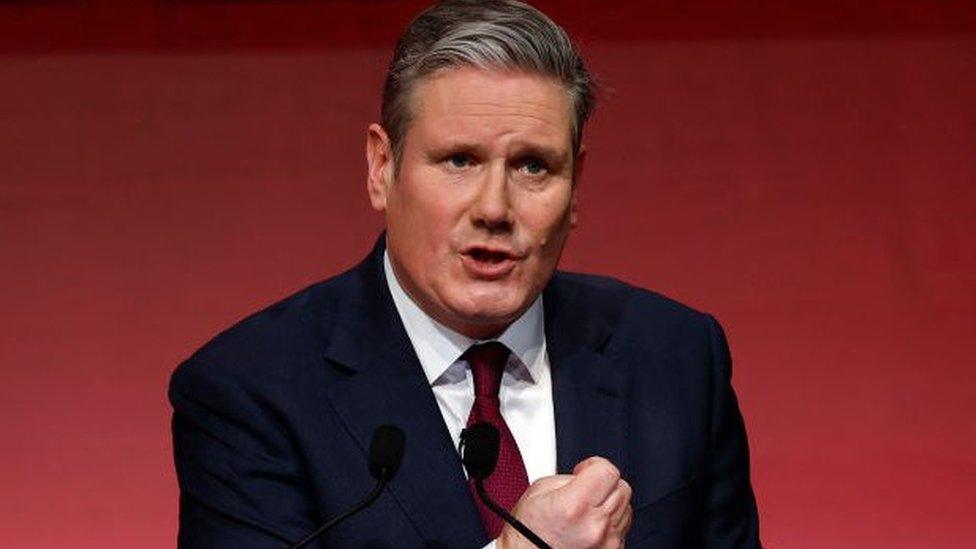Labour calls for immediate humanitarian ceasefire in Gaza for first time
- Published

Shadow foreign secretary David Lammy says Labour's position is now in line with the UK's allies
Labour has called for an immediate humanitarian ceasefire in Gaza for the first time since the outbreak of the conflict in October.
The move comes after days of party debate on how to vote in Parliament on an SNP motion calling for a ceasefire.
Ten Labour frontbenchers quit in order to vote for the SNP's previous call for a ceasefire in November.
Shadow foreign secretary David Lammy said Labour had shifted because the situation in Gaza had "evolved".
Mr Lammy said Labour was "mirroring the language" of the UN and the remaining members of the Five Eyes alliance - made up of the United States, Australia, New Zealand and Canada's intelligence services.
On Tuesday, Labour tabled an amendment, which for the first time uses the phrase "immediate humanitarian ceasefire", to the SNP's ceasefire motion.
Labour Leader Sir Keir Starmer has for some time been calling for the fighting to stop "now".
It means that in effect Labour's position is now much closer to the SNP's - although Labour's amendment emphasises more than the SNP's the role of Hamas as well as Israel in bringing about a lasting ceasefire.
A party spokesperson said: "Our amendment calls for an immediate humanitarian ceasefire, in line with our allies.
Speaker's decision
"We need the hostages released and returned. We need the fighting to stop now. We need a massive humanitarian aid programme for Gaza. And any military action in Rafah cannot go ahead.
"We want the fighting to stop now. We also have to be clear on how we prevent the violence starting up again. There will be no lasting peace without a diplomatic process that delivers a two-state solution, with a safe and secure Israel alongside a viable Palestinian state."
The issue of which amendment or amendments are voted on is one for Commons Speaker Sir Lindsay Hoyle, who will make a decision later this morning.
He will take advice from Commons clerks on what to do in accordance with conventions. Some procedural experts believe he is most likely to select only a government amendment.
But it is very unusual for both the government and the main opposition party to be trying to amend another opposition party's motion - and, as was seen in the fraught Brexit years, conventions can be flexible.
The government amendment calls for an "immediate humanitarian pause" in the fighting before "moves towards a permanent sustainable ceasefire" that involve Hamas freeing all hostages, relinquishing control of Gaza, and international efforts to create a two-state solution.
It "supports Israel's right to defence, in compliance with international humanitarian law".
Labour has not said how it plans to vote if its own amendment is not voted on.
Changed position
Israel declared war on Hamas after the group led an attack on communities inside Israel, killing around 1,200 people.
Since then, according to the Hamas-run health ministry, more than 29,000 Palestinians have been killed and 69,000 wounded as Israel has launched missiles and ground operations into the Gaza Strip in response.
The Israeli Defense Forces says it has killed nearly 12,000 Hamas fighters in Gaza, in addition to more than 1,000 fighters inside Israel. It has not disclosed how it has calculated these figures.
Until now the Labour Party's leadership has avoided using the phrase "immediate ceasefire", which led to a clear split in the party in November when 56 of Labour's 198 MPs backed an SNP motion.
Ten of those were frontbenchers who had to leave their positions for holding views against the party leadership.
Sir Keir had instead called for a "humanitarian pause" and an end of fighting "as soon as possible".
Whether or not those positions are substantively different, the crucial political fact is that this is designed to be seen as a slight hardening of Labour's position towards Israel.
Clive Betts, who was one of the Labour MPs to defy the leadership in November, said Labour's amendment was "a really firm, strong statement, which I think the party will unite behind".
However, left-wing campaign group Momentum, said: "Scratch the surface of this amendment and it falls well short of what the moment requires: a clear call for an immediate ceasefire.
"By making its call for a ceasefire so conditional and caveated, the Labour leadership is giving cover for Israel's brutal war to continue."
Mr Lammy told the BBC that Labour's amendment "reflects the complexity of the situation" and the desire for "a lasting humanitarian ceasefire".
He contrasted this with the SNP motion, which he said "feels unbalanced".
Lisa Nandy, shadow secretary of state for international development, told BBC Radio 4's Today programme: "It [SNP motion] doesn't lay out any kind of political horizon that would make a ceasefire either achievable or sustainable.
'U-turn'
"But secondly it doesn't make clear that this term ceasefire... must be observed by both sides."
Asked if Labour would vote for the SNP's motion if their amendment is not called she said that would be a "question for the chief whip".
SNP Westminster leader Stephen Flynn welcomed what he described as a "long-overdue U-turn" by Sir Keir.
He said the Labour leader was "forced into this position through public pressure and, in particular, by the SNP".
Mr Flynn also called on Prime Minister Rishi Sunak to back an immediate ceasefire.
This week, Sir Keir has come under increasing pressure after the Scottish Labour party passed a motion calling for an immediate ceasefire in Gaza.
Labour's position on Gaza has also come under scrutiny in the upcoming Rochdale by-election, where the party dropped its parliamentary candidate over antisemitic comments he apparently made during a discussion about the conflict.
The SNP motion calls for an "immediate ceasefire in Gaza and Israel" as the "only way to stop the slaughter of innocent civilians".
If passed, the SNP's opposition day motion is not binding on the government. Instead, they typically express opposition MPs' position on a particular issue.
The government has also put forward its own amendment, calling for "an immediate humanitarian pause" and supporting moves "towards a permanent sustainable ceasefire".
The move threatens to expose Labour splits over the issue, as it makes it less likely the Commons Speaker will choose the Labour amendment for debate on Wednesday.
If this happened it would leave Labour MPs with the choice of voting for the government's position, which does not go as far as calling for an immediate ceasefire, or the SNP's stance.
If - as seems likely - Labour were to call for its MPs to abstain on the SNP motion, Mr Lammy made clear "collective responsibility" would apply, meaning shadow ministers who vote for it would be expected to resign.
Party sources are not anticipating further resignations - but some backbench Labour MPs could still rebel.
Additional reporting by Becky Morton
Related topics
- Published16 November 2023

- Published17 February 2024

- Published18 February 2024
